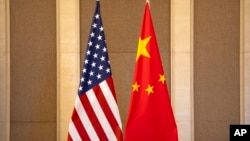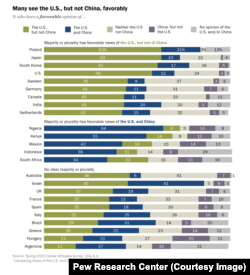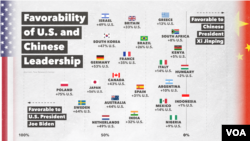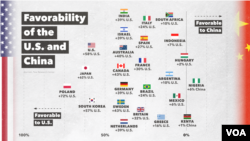Ahead of the APEC Economic Leaders’ Week in San Francisco, where U.S. President Joe Biden and Chinese leader Xi Jinping are expected to meet, a study comparing views of China and the U.S. across 24 countries shows that people’s views of Washington are more favorable than those of Beijing, especially among high and middle-income countries.
The new data essay released by Pew Research Center Monday, compares previously published views of the U.S. and China and highlights the differences across more than 10 measures, including confidence in U.S. and Chinese leaders, perception of their economic power and technological prowess.
Countries featured in the study include advanced economies in North America and Europe, as well as middle-income countries in Asia Pacific, Latin America, and Africa.
Skewed to the U.S.
When it comes to favorable views of the U.S. and China, the study found that high-income countries tend to “skew toward the US.” Japan and South Korea favor the U.S. over China by 57% and 62%.
There are smaller differences in views of the two countries in middle-income countries surveyed with countries having “generally positive” views of China and the United States.
The difference in the confidence in Biden and Xi was prominent in countries such as Germany and Sweden where 53% and 64% more expressed confidence in Biden over Xi. In Indonesia and Kenya, the difference in confidence toward the two leaders was only a few percentage points, with Biden maintaining a slight lead over Xi.
“These gaps in views of the American and Chinese leaders reflect both souring attitudes toward Xi in high-income countries and greater confidence in Biden,” the Pew researchers wrote.
Although views of China and the U.S. have fluctuated over the years, according to Pew, they have "rebounded dramatically in many of the countries surveyed” since Biden came to power, while views of China remain “among their most negative.”
“Confidence in the U.S. president was relatively low in 2007 when Bush was president but increased when Obama took office in 2008,” said Christine Huang, research associate at Pew Research Center and one of the authors of the latest study.
“Favorable views of the U.S. likewise because substantially more positive in most countries surveyed during the Obama era. Confidence in China’s president has also declined over time alongside favorable views of the country,” she told VOA in a written response.
Richard Turcsányi, an expert on Chinese foreign policy at Palacky University Olomouc in the Czech Republic says “high-income countries are more often than not U.S. allies, so they are comfortable with the current international order …They tend to be democratic and thus dislike China for its authoritarian system.”
He said middle-income countries are rarely traditional U.S. allies and they are often “not fully democratic,” so these countries want to change some things in the world to elevate their roles.
“Many of them inhibit various dislikes and feelings of injustice, often targeting the U.S., Europe, and the West in general and China seems like an alternative. While they may not exactly like Beijing, the difference between the U.S. and China will be less pronounced in their eyes,” he added.
U.S. more interventionist
While the U.S. enjoys more favorable views than China in general, people in the 24 countries surveyed hold mixed views of Washington and Beijing when it comes to foreign policy.
The study shows that the U.S. is more likely to be viewed as an interventionist power than China in almost all countries. In Greece 93% of the people surveyed viewed the U.S. as a country that interferes in other nations’ affairs and 56% viewed the same of China leading to a 37% point difference in China’s favor. In Australia however, there is only a two-percentage point difference with Australians surveyed viewing the U.S. similarly as countries that will intervene in the affairs of other countries.
More people across the 24 countries, including in Japan, Canada and Mexico, also think the U.S. is more likely to take their countries’ interests into account than China. In addition to that, more people surveyed in the 24 countries, including South Korea, the U.K. and India, think the U.S. contributes to global peace and stability than China does.
Pew researchers say these results show that global views of the U.S. and China may not be as absolute as the overall favorable ratings both countries receive.
“A closer look at each country’s image shows areas where China outperforms the U.S.,” Huang from Pew told VOA.
Tech and military power
Compared to the starker contrasts between views of the U.S. and China in measures such as favorability and confidence in leaders, the study found that differences are less prominent in areas like technological power.
Among all the countries surveyed, a median 72% of the people view U.S. technology as “the best or above average,” and 69% have similar thoughts about Chinese technology. Despite the small overall difference, people surveyed in Latin American countries, such as Mexico and Argentina, were more likely to rate China’s technological achievements positively while U.S. technological achievements tend to receive more positive reviews in Asian countries included in the study, including South Korea and Japan.
Huang from Pew told VOA that regional variations in views of the U.S. and China’s technology may be tied to differences in market penetration of various products. “Chinese technology is seen especially likely to be considered well-made in Nigeria, where Chinese companies currently have control of much of the mobile market share,” she said.
While majorities in every country surveyed say the American military is above average or the best and only about half of the countries surveyed say the same of China, the Pew study found that “there is little difference” in ratings of Chinese and American militaries between middle-income countries such as Mexico and high-income countries like Germany.
Some researchers say results from public opinion studies can serve as important reference points for policymakers around the world. “Policymakers in many countries depend on public opinion because they stand in elections,” Turcsányi in Czech Republic told VOA.
“If the general mood around the leaders is that China is seen negatively with little economic promises, leaders will be willingly or unwillingly influenced by this sentiment and will act on it,” he added.
Pew researchers said they hope findings from the study can help policymakers and government officials establish a better understanding of the geopolitical balance between the U.S. and China.
“We can't say for certain how it will be used, and it’s up to the officials to hopefully watch programs like this one and learn from our research,” Laura Silver, associate director at Pew Research Center and one of the authors of the study, told VOA.







